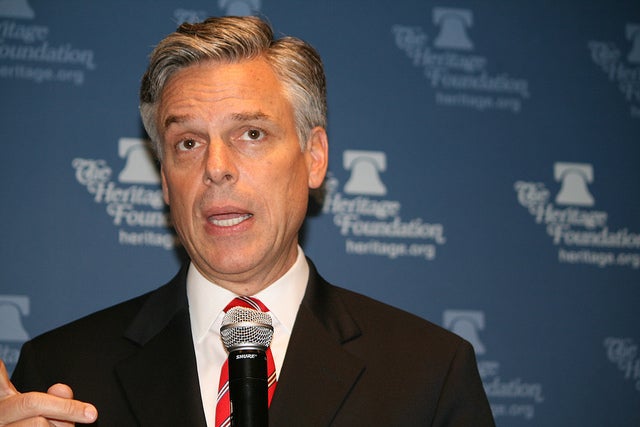Former Utah Gov. Jon Huntsman clarified his position on how policymakers should deal with climate change. In a speech Tuesday at The Heritage Foundation he said, “There’s not enough information right now to be able to formulate policies.”
Even if there were a consensus that there is global warming, and it’s man-made, then the United States might still choose not to take unilateral action, he added.
Premature political action, he noted, could jeopardize economic recovery for a potentially ineffectual attempt to tackle the issue. “The scientific community owes us more,” Huntsman, also a former U.S. ambassador to China, told a group assembled for the weekly Bloggers Briefing at Heritage.
Absent such information, Huntsman said he would not “unilaterally disarm our economy or our job creators.”
Asked about his previous expressions of confidence in a scientific consensus not just that the earth is warming, but that man’s actions have contributed to it, Huntsman said he still believed that scientific consensus should dictate policy, but that the consensus had been shaken.
When there is an “interruption or disconnect” in such an established theory, he noted, “I think the onus is on the scientific community to help clarify the situation.” Huntsman cited leaked emails from Great Britain’s East Anglia Climate Research Unit, which showed renowned climate scientists discussing efforts to subvert their more vocal critics.
But even granting such a scientific consensus within the United States, Huntsman added, it would not likely be enough to adequately address the problem. “If we’re reading from a different scientific text than the Chinese or than, say, the Indians,” he noted, “then I think we’re going to come up with different policy fixes that might make our own journey more onerous than that that the Chinese are taking.”
In other words, if other large emitters do not acknowledge the same scientific facts as the United States, and hence do not pursue policies as aggressive as those on the home front, American policymakers could wind up enacting punitive restrictions on the American economy for a relatively small reduction in global carbon emissions.

























